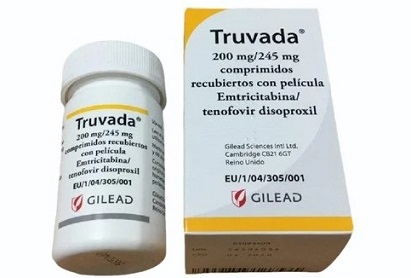Pharma News: Gilead Facing Multiple Lawsuits Over Its Tenofovir Disoproxil Fumarate-Based HIV Drugs
Nikhil Prasad Fact checked by:Thailand Medical News Team Jan 17, 2024 1 year, 3 months, 1 week, 2 days, 5 hours, 17 minutes ago
Pharma News: In the ever-evolving landscape of pharmaceutical litigation, Gilead Sciences has found itself embroiled in a protracted legal battle over its Tenofovir Disoproxil Fumarate (TDF)-based HIV drugs. The core of the dispute revolves around allegations of negligence, an unconventional approach where the focus is not on the inherent defects of the drug but on the purported delay in developing a safer alternative. A recent decision by a California appeals court has added a layer of complexity to this legal saga, allowing the plaintiffs' negligence claim to advance, with potential ramifications across multiple industries.
 Unknown on to many, TDF based HIV Drugs can cause osteopenia,
Unknown on to many, TDF based HIV Drugs can cause osteopenia,
osteoporosis, Fanconi syndrome and various kidney issues.
Background
The origins of the controversy trace back to 2001 when Gilead introduced its TDF-based HIV medication. While the drug proved effective in the treatment of HIV, users faced potential adverse events, notably skeletal and kidney damage. Simultaneously, Gilead's research had unveiled a potentially safer alternative named Tenofovir Alafenamide Fumarate (TAF). Allegations from approximately 24,000 TDF users contend that Gilead intentionally delayed the development of TAF to maximize profits from its existing TDF medications.
Plaintiffs' Nuanced Claims
The crux of the plaintiffs' argument lies not in denouncing TDF as inherently flawed but in asserting that Gilead breached its duty of reasonable care by withholding the development of a safer alternative. The plaintiffs argue that Gilead's actions effectively deprived patients of the option to choose between two drugs with differing risk profiles. Additionally, they claim fraudulent concealment, accusing Gilead of failing to inform TDF users about the existence of a potentially safer alternative, TAF.
Gilead's Defensive Posture
In response, Gilead staunchly maintains that a plaintiff cannot seek compensation for harm caused by a non-defective product. The company contends that it had no duty to disclose information about TAF when the drug had not yet received regulatory approval. Emphasizing that TDF medications have held FDA approval for over two decades and continue to be safe and effective in treating and preventing HIV, Gilead expresses concern that the court's decision could set a precedent holding manufacturers liable for non-defective products. The company asserts that this might hinder innovation and product improvement across various industries.
Court Decision and Potential Implications
The latest development in the legal saga occurred in the California Court of Appeal, where two of the plaintiffs' claims were dismissed, narrowing the focus to one allegation of negligence.
https://law.justia.com/cases/california/court-of-appeal/2024/a165558.html
Gilead vehemently opposes this decision, contending that it overturns established California law and could have widespread negative consequences. The court, however, asserts t
hat the duty in question pertains to reasonable care rather than demanding perfection in a product.
Gilead’s spokesperson told
Pharma News outlet, “If the decision is not overturned, the court’s decision will have widespread, negative consequences across all fields of innovation and manufacturing, undermining the development of new products and discouraging improvement of existing products.”
Gilead further contended that a flood of lawsuits could result from similar scenarios, a claim the court thinks “overstates given the narrowness of the duty at issue.”
The court however responded, “The duty is reasonable care as opposed to a perfect product.”
Gilead spokesperson said, “We will continue to defend ourselves” and is evaluating its appellate options.
Multiple Lawsuits Unfold
The legal entanglements for Gilead extend beyond the aforementioned lawsuit. Recent claims by plaintiffs Darren Johnson and Roslyn Rochester target Gilead's older HIV medicines, including Viread, Truvada, Atripla, Complera, and Stribild. The plaintiffs argue that these drugs, all containing TDF, caused injuries due to the known risks associated with TDF. Moreover, they allege that Gilead's knowledge of the risks extended to a safer alternative, TAF, and yet the company delayed its introduction, prioritizing TDF sales.
In another lawsuit, California residents Michael Lujano and Jonathan Gary assert that Gilead deliberately shelved TAF in favor of maintaining a monopoly on TDF sales. The plaintiffs claim that Gilead concealed information about the health risks associated with TDF, leading them to suffer from osteopenia, osteoporosis, and Fanconi syndrome.
The lawsuit contends that Gilead's actions were profit-driven, with the company withholding TAF until the patent exclusivity on TDF ran out.
The plaintiffs in this lawsuit further highlight a statement made by Gilead's former CEO, John Martin, in 2004, claiming that the company was discontinuing TAF research. The lawsuit alleges that this statement was a misrepresentation intended to mislead the public and medical professionals into continuing to prescribe and take TDF. The plaintiffs argue that Gilead, in fact, continued its TAF research program and applied for several TAF patents, revealing a deliberate attempt to maximize profits from TDF.
The Complex Legal Landscape
The legal battles surrounding Gilead's HIV drugs raise critical questions about pharmaceutical liability and accountability. The outcomes of these lawsuits could significantly impact the industry, shaping the future trajectory of drug development, patient safety, and corporate responsibility.
Conclusion
Gilead Sciences finds itself navigating a complex web of legal challenges, with patients not contesting the inherent defects of their HIV medications but the alleged delay in introducing a safer alternative. The recent decision by a California appeals court to allow the negligence claim to proceed signifies a potential shift in legal precedent. As the legal battles unfold, stakeholders in the pharmaceutical industry observe closely, considering the possible implications on innovation, product development, and patient well-being. Gilead continues to defend its position, emphasizing the safety and efficacy of its FDA-approved TDF medications while grappling with accusations of prioritizing profits over patient health. The resolution of these lawsuits may shape the future landscape of pharmaceutical accountability and responsibility.
For the latest
Pharma News, keep on logging to Thailand Medical News.
